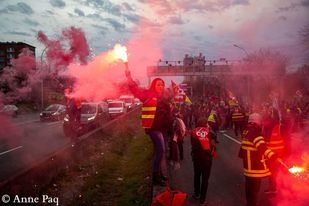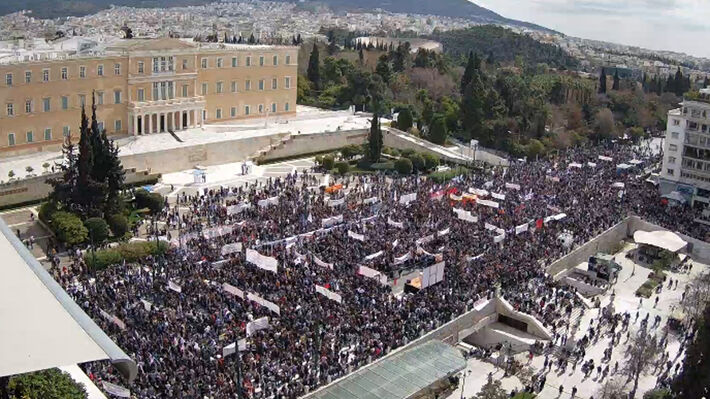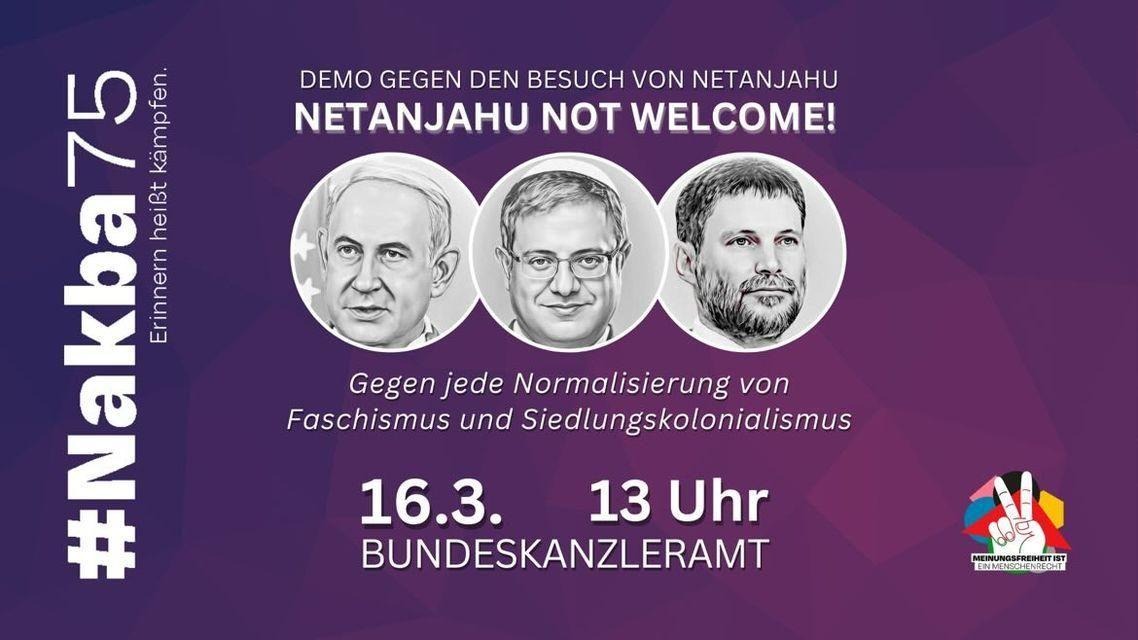The tragic train accident that took place on February 28 on the railway line Thessaloniki-Athens, leaving 57 people dead, has sparked a record of protests across the country, which converged into a massive strike on March 8, Women’s Day. On that day demonstrations were organized in more than 80 towns, transforming the foreseen Women’s Day marches into massive strike events that involved trade unions, women’s organizations, school and university students and political parties. The atmosphere reminded everyone of the days of unrest of 2010-12 against austerity memoranda. And the political agenda has been reversed completely.
A unique, powerful 8th of March
This strike was the culmination of a week of daily protests that broke out from the very first day of the accident. The public workers confederation ADEDY and the Labor Centers of Athens and other cities’ private sector federations modified their four hour stop calls into 24 hour strikes and picketing for the catastrophe in Tempe. Evidently, the entire country was paralyzed: railways, ports, ferries, public transport, schools, hospitals, municipalities, factories, construction sites, public and private sector workplaces.
All attempts by the panicked right wing government of Konstantinos Mitsotakis to prevent participation in the protests by closing all central metro and tram stations by order of the police failed completely. Crowds of demonstrators started arriving in the centre from early morning by every means of transport from every neighborhood of Athens. By the time of the strike call at midday, the streets were already flooded.
The rally was the largest of the last years and can only be compared in size to the big general strikes and the squares movement of 2010-12, and the rallies for “OXI”(NO) before the referendum in 2015. In the centre of Athens, streets and sidewalks were crammed with people. Four hours after the start of the rallies, blocks of demonstrators continued to arrive at Syntagma Square. The march became an endless continuous string that made a loop along the central boulevards of the city center. It took us two and a half hours to march 800 meters from the «8th of March strike» assembly area to Syntagma.
Hundreds of banners of federations and unions were present. There were massive blocks of railway workers and all transport workers, teachers and other education workers, municipality, hospitals, ministries, but also artists (who are at the moment in a state of continuous struggle against the ministry of Culture) and many other unions from every small and large private sector.
There was an overwhelming participation of young people: the students with their school banners holding self-made improvised placards. But also student associations from all the universities in Athens, many bearing resolutions for occupations. There were families with their children. The entire spectrum of left parties, from Syriza and the Communist party to the anticapitalist left and anarchists were there. Refugees from the Ritsona camp, migrants of the Cameroonese community and other immigrant communities. The slogans “It was not an accident, it was a murder — down with New Democracy”, “Murderers”, “The friends of Mitsotakis are the rapists, the church and capitalists”, “With women in the front line — united we fight”, “Privatizations kill”, vibrated the atmosphere. But also “Disobedience — continuous strike”, demanding an escalation of the struggle.
What happened at Tempe is not an accident, it’s a crime
The collision of the two trains with 57 people dead and hundreds injured is not an accident, it is a serious crime. Responsibility falls firstly on the government of Kostas Mitsotakis and certainly on all the previous Greek governments, who provided for the wrecking and selling off of the railways. It is all about the privatization of the railways, whose profits are being plundered by private individuals, while breakdowns are a daily occurrence on the so called “super-modern” trains.
The two trains had raced towards each other for 12 minutes before colliding. One was going up to Thessaloniki (the passenger Intercity) and the second, the freight, was going down from Thessaloniki to Athens. The trains had been diverted onto a single track after an overhead cable was cut. The station master at Larissa by confusion instructed the passenger train to proceed along the same track as the freight train. He has since been arrested.
The first reaction of the government of New Democracy was to manipulate public opinion by claiming that it was a “human error” and pointing the finger at the 59 year old station master, who had been transferred to this post shortly before the accident and was on shift alone (without the foreseen second staff member). The scapegoating didn’t work.
Soon it was revealed that the Panhellenic Federation of Railway Workers (POS) just a few days before the accident, in one of many such documents, had warned the administration about the lack of electronic safety systems. Kostas Genidounias, president of the train drivers association, came out on state TV and clearly stated that the collision wouldn’t have happened if the railway had had automatic signaling. He declared that automatic safety systems hadn’t been working for years. “All these years we have been notifying and warning that the electronic systems do not work and everything is done manually on the Athens-Thessaloniki line”, he said. “Nothing is working. Not even the indicators, the traffic lights, or traffic control work. If these had worked, the train drivers would have seen the red signal and the trains would have stopped within 500 metres of each other. But train drivers move from station to station communicating with manual wireless devices”! He also commented on the prime minister’s planned visit to a remote control signalling centre near Thessaloniki: “Can someone tell us where the signalling and remote control center in Northern Greece is, and to where it applies?”
Standing on long lasting and recently active traditions of militancy and distrust for state authority, the vast majority of the Greek people turned their grief into anger and came out into the streets. From the first evening, angry and growing demonstrations refused to let the government dodge the blame. Most of the demonstrations were met with repression by riot police, but instead of a crackdown, this made people angrier.
The “human error” argument was quickly dropped. Transport minister Kostas Karamanlis resigned, apologizing for the state of the rail network. “It’s a fact that we inherited the Greek railway in a state that does not fit into the 21st century, I am paying the consequences for decades of negligence”, he said. Soon after, a video of a parliamentary discussion that took place 10 days prior to the accident circulated on social media, showing him declaring aggressively that questioning the safety of the railways is unacceptable! Another cabinet member (Adonis Georgiadis) rushed to defend the transport minister by saying cynically: “Had he accepted the lack of safety, no one would have ever traveled by train”!
The next maneuver of the government was to seek for a moratorium, so they called for a three-day national mourning. It failed as well, as the Athens Metro Trade Union called for programmed work stops in protest and on March 2 merged with the mobilizations of the artists, who marched under heavy rain and police teargas to the central railway station in Athens. They were stopped by the special forces from reaching the headquarters, but it was a wonderful show of solidarity. This gave space for the railway workers to come to the fore with repeated two day strikes and a huge rally in front of the parliament on Sunday the 5th of March. As the railway trade union representative was reciting the names of the dead railway men killed at Tempe, the people at the Syntagma square applauded over and over again. Shortly after, they were attacked by the police as usual.
On that Sunday evening, confronted with the explosive atmosphere and the unfolding of protests, Kyriakos Mitsotakis took to social media to retreat and apologize. “We can’t, won’t and shouldn’t hide behind human error”, he wrote and went on to claim that he already had great plans for rail reforms…
So how did we arrive at this tragic fiasco?
A history of shame
The first railways were installed in Greece in the second half of the 19th century, connecting Thessaloniki with Belgrade and Istanbul, and later Athens with Thessaloniki. The railway was at that time of great importance for the Greek ruling class, both from an economic and from a military-strategic point of view (for the expeditions of Greek capitalism, and transfering troops to war rapidly). The railway workers union has a long history of struggles in the Greek labour movement. Their strike in 1921 in the midst of the Greek-Turkish war for the control of Asia Minor played a vital role in the anti-war movement of that period. The workers were finally conscripted, but they posed great resistance to the plans of the Greek government.
After the Second World War, the orientation of the Greek ruling class turned towards the use of automobiles. The train network never reached the density and quality of other European or neighbouring countries, however in a mountainous country such as Greece, trains remained a secure and affordable (though slow) means of transport. Things deteriorated in the mid-1990s, when the “modernist” governments of PASOK divided OSE, the Railway Organization, into smaller companies, separating transport from maintenance, infrastructure, design and construction, etc. Ambitious plans discussed “upgrading” the railway connections, but it turned out to be just talk. Studies were elaborated and approved but remained on paper. Government officials and bosses would regularly complain about OSE being detrimental to the economy, a victim of “old-fashioned, selfish” trade unions, a company that “had to be privatized to be saved from itself”! The trade union of OSE remained militant and confronted privatization throughout the entire 1990s. In 1999 they took a historic resolution to deny NATO’s military material used in the war against Serbia being transported with Greek trains. It was a great support and connection with the anti-war movement of the time.
When the financial crisis hit the Greek economy in 2010, privatization plans accelerated. In 2013, Trainose, the transport company and main subsidiary of the old unified OSE, was transferred to the privatization memorandum fund, the notorious TAIPED. Budget cuts and vast personnel reduction followed.
In 2017, under the government led by Syriza’s Alexis Tsipras, Trainose was sold to the Italian “Ferrovie Dello Stato Italiane” for a mere 45 million euros. The new company “Hellenic Train” focused entirely on the maintenance of the profitable Athens-Thessaloniki route. Almost all other lines were abandoned or closed, and they concentrated on high-speed trains — with the main goal being to compete with air travel. New trains — second-hand, actually — that could reach speeds of up to 200 kilometers per hour were installed. The fact that neither the infrastructure nor the safety system were designed for such speed was not important to the new bosses. On top of that, the safety system stopped working five years ago, since 2018. They didn’t bother to fix it. Ticket prices of course soared and Hellenic Train thrived, while the other railway companies of infrastructure and maintenance had to be administered by OSE.
But public investment had since the 1990s been replaced by contractors through a form of public-private partnerships. These contractors (Alstom, Bombardier and their Greek partners) pocketed millions of euros to install safety systems that were not compatible with each other, resulting in malfunction and additional claims, all paid by the state owned OSE. The system worked rudimentarily until 2014, when it was abandoned to its fate and dissolved following the effects of austerity memoranda demanded by the European Union and the International Monetary Fund in return for bailout loans.
All the efforts made by OSE since then to put the old system back into operation or to install more modern European systems have so far stumbled on the manipulations of the contractors. In 2014 a joint venture was commissioned with a 41 million euro contract to revive the old system, “within two years”. Today, nine years later, and after several additional claims being added to the fees of the contractors, most of the network still does not even have traffic lights. The vicious circle is repeated through the “entanglement” between the companies and the governments. This is why New Democracy, the main party of the ruling class, rushed to conceal the long-term structural political failures under the “human error” narrative.
What now?
The strategy of the government of Kyriakos Mitsotakis is faltering. Despite gestures such as the Prime Minister’s excuses and granting (more than) generous compensations to the families of the victims, the anger has not settled. The government has announced that they will double the staff at train stations but, without full time experienced personnel, such a thing is impossible unless they reduce train routes. There is no easy way out of the mess they created.
To get a glimpse of the degree that the political context has been reversed, New Democracy had scheduled for March 6 to announce general elections on April 9. Because of intricacies of the electoral system, 2023 is expected to be a year of multiple elections, including parliamentary and regional. Until Tempe and despite their failures, New Democracy had serious expectations to lead the race for the next office, given the inertia of parliamentary opposition led by Syriza. Tempe has turned the picture upside down. Mitsotakis has suspended all talks of elections, internal dissident politicians are resigning his party and the polls show a serious decline in the vote for New Democracy.
Instead of diffusion of the protests, the last three days saw a further escalation of the struggle. While this article was being finalized, another assembly was taking place at Syntagma square and marched to the headquarters of OSE. The two labor confederations, public sector ADEDY and the until now paralyzed private sector GSEE are now calling for a general strike on March 16. This is the next step forward. It shows that trade unions still do matter for the case of Tempe and for the working class in Greece. The left parties have played a visible role in organising the resistance and their strategy may determine what happens from now on.
In any case, it looks like after four years of bitter struggles and bad news, mass struggle is back and can become again a source of inspiration both inside the country and internationally.




